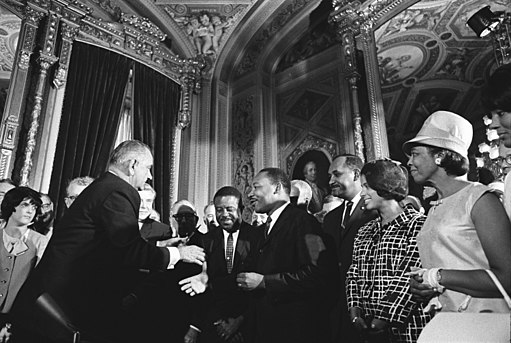Module 5: Civil Rights
Section outline
-

Image Attribution: Modification of “Lyndon Johnson and Martin Luther King, Jr. – Voting Rights Act” by Yoichi Okamoto/Wikimedia Commons, Public Domain
The struggles of citizens who happen to be members of "identifiable groups " for equal treatment and inclusion denied them by government and society based ascribed traits is the central concern of civil rights. Despite the flowering words of the Declaration of Independence and the U.S. Constitution about freedom and equality, this country began with many citizens being treated differently based on status, race, ethnicity, color, gender, sexual orientation, religion, and disability.
The fight for civil rights encompasses changes in laws and governmental actions such that groups of Americans excluded from certain rights and privileges can obtain the same rights and privileges as all other Americans. In this module, we will examine the struggles of African-Americans, women, Hispanics and Latinos, Asian-Americans, Native Americans, the LGBTQ community, persons with disabilities, and religious minorities to combat discrimination, unequal treatment and sometimes hate that has been an essential feature of the growth and progress of American Democracy.
Upon completion of this module, you will be able to:- Explain the differences between having civil rights in law and
in practice,known as "de jure," but not in fact, also known
as "de facto," related segregation and inequality of opportunity and
outcomes. (CLO 3, 4, 5)
- Describe the roles and contributions racial and non-racial groups
made through citizen action and activism to ensure that civil rights are
protected from the past to the present. (CLO 3, 4, 5)
- Explain the major laws and governmental actions leading to the expansion of rights and privileges for major groups. (CLO 3, 4)
- Describe the roles of the major executive, legislative, and judicial institutions in advancing and impeding the expansions of rights and privileges
of discriminated groups. (CLO 1, 3, 4)
To achieve these objectives:- Read Chapter 5 in Introduction to American Government. Including:
- Introduction to Civil Rights (opens in new window)
- What are Civil Rights and How Do We Identify Them? (opens in new window)
- The African American Struggle for Equality (opens in new window)
- The Fight for Women's Rights (opens in new window)
- Civil Rights for Indigenous Groups: Native Americans, Alaskans, and Hawaiians (opens in new window)
- Equal Protection for Other Groups (opens in new window)
- Chapter 5 Review (opens in new window)
Module Pressbooks Resources and Activities
You will find the following resources and activities in this module at the Pressbooks website. Click on the links below to access or complete each item.
- Explain the differences between having civil rights in law and
in practice,known as "de jure," but not in fact, also known
as "de facto," related segregation and inequality of opportunity and
outcomes. (CLO 3, 4, 5)
Background Colour
Font Face
Font Kerning
Font Size
Image Visibility
Letter Spacing
Line Height
Link Highlight
Text Colour
